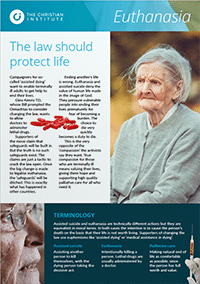A woman who failed in her high court bid to challenge the law on assisted suicide last year has taken her case to the Court of Appeal today.
Debbie Purdy, a multiple sclerosis sufferer wants to know if her husband would be prosecuted if he travels with her to a Swiss suicide clinic to help her end her life.
Assisted suicide is legal in Switzerland but under British law, aiding and abetting suicide is a criminal offence punishable by up to 14 years in prison.
Miss Purdy’s case is backed by ‘Dignity in Dying’, a lobby group that campaigns for change in the law on assisted suicide.
She claimed to be seeking clarification on whether or not her husband will face prosecution if he helps her travel to Switzerland to end her life if her condition worsens.
The Director of Public Prosecutions (DPP), Sir Ken MacDonald, had earlier turned down her request. He explained that she was effectively asking for a change in the law, which lies outside his authority.
In October there was a judicial review of that decision. Two judges agreed with the DPP that meeting her request would need legislative change which only Parliament could carry out.
Lord Justice Scott Baker expressed sympathy for Miss Purdy but said: “This would involve a change in the law.
“The offence of assisted suicide is very widely drawn to cover all manner of different circumstances; only Parliament can change it.”
Leading palliative care specialist Dr David Jeffrey commenting in a letter to the Scotsman today said: “As a caring society, we should reject attempts to legalise euthanasia or physician assisted suicide (PAS).”
He made it clear that legalising euthanasia is not compatible with maintaining and improving the high standards of palliative care.
“Palliative care values individuals to the end of their natural lives and strives to relieve suffering of patients and their families,” he added.
Dr Jeffrey warned last year that “articulate” campaigns to weaken the law on assisted suicide could put vulnerable people at risk.
He said: “My concern is with people who are frightened, possibly depressed and bit confused.
“These are people who don’t know where to turn and who feel they are a burden. The law has to protect them.”
But the lawyer acting for Miss Purdy argues that the law on assisted suicide needs clarifying. He says the Director of Public Prosecutions should be required to issue specific policy guidelines.
He argued that such guidelines already exist for crimes of domestic violence, bad driving and football-related offences, and the lack of proper guidance on assisted suicide infringes Miss Purdy’s right to private and family life under the European convention on human rights.
The British Medical Association is opposed to allowing doctors help patients to kill themselves. Dr George Fernie of the BMA recently said: “People when they have a debilitating illness that may end their life are extremely vulnerable, they’re at a fragile stage.
“And our worry is they’re going to contemplate ending their life when that really isn’t their wish.”
“You just don’t know what will happen”
In his book Against Physician Assisted Suicide, Dr David Jeffrey tells the story of a former army instructor who was being treated for terminal cancer and was determined to commit suicide.
After a discussion with the doctor, it emerged that he was missing the Army, and was subsequently taken to watch a passing-out parade of young recruits, where a party had been arranged in his honour.
“His life was transformed,” Dr Jeffrey said. “He had a purpose and his demeanour completely changed. He died two weeks later, comfortably. People’s lives always have that potential. Even in the midst of suffering there can be change.
“You just don’t know what will happen.”
“A different life”
The Times recently reported the story of Matt Hampson, a former rugby player who was paralysed from the neck down during training and now requires a ventilator to breathe.
With the help of carers and a custom-built house, he has been able to set up a website, is writing an autobiography and is the patron of a charity for disabled children called Special Effects.
He says: “I don’t live a bad life, I live a different life. I use my brain more than my brawn now. It has helped me become a more rounded person. I think about things more.
“I’ve had to grow up quite a bit and do things that most 23-year-olds don’t do.”
“I’m grateful I wasn’t allowed to end it all!”
Alison Davis is National Co-ordinator of No Less Human.
She was born with severe spina bifida, and is dependent on a wheelchair. She is often in extreme pain for hours at a time. She says that for many years she wanted to “end it all”.
“If euthanasia had been legal, I would certainly have requested it and I wouldn’t be here now,” she says.
But after several serious suicide attempts, blocked by the intervention of Alison’s friends, she began to change her mind.
Alison met the disabled children she had been sponsoring through a charity. The experience led her to think, for the first time in over ten years, “I think I want to live”.
She says: “I’ll always be grateful to the friends who saved my life (though I wasn’t at the time). And I’m especially thankful there was no possibility of persuading my doctors to legally help me die.”
She believes that disabled people “deserve the same kind of help routinely given to those who do not have a physical condition but who feel suicidal”.

